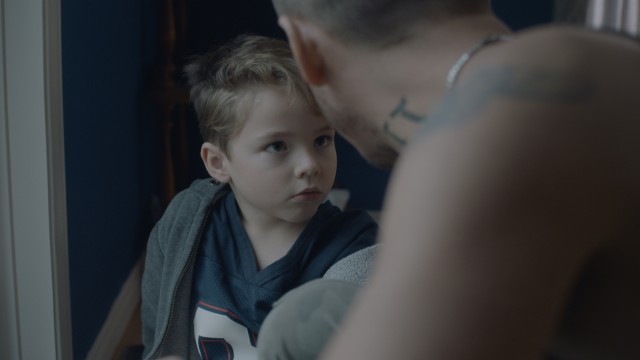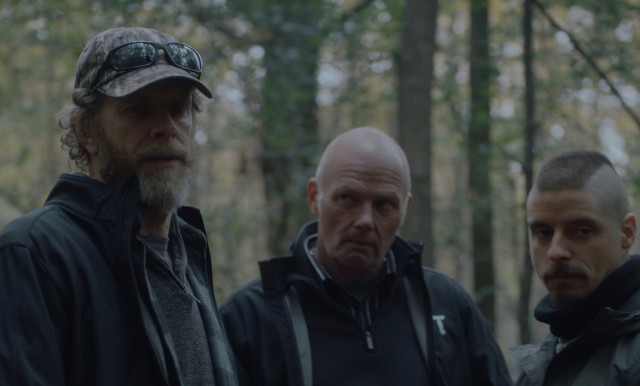One afternoon, Alex and his father meet up with friends in the forest. What seems like a casual playdate quickly takes an unsettling turn when six-year-old Alex slowly pieces together what his father, and the other adults, are there to do. Set in the not-so-distant future, Pier-Philippe Chevigny’s Recrue (Rebel) explores the father/son bond in the context of a far-right militia group, as the son starts to understand the darker side of the person who lovingly cares for him daily.
“Rebel is about that moment of realization”
The inspiration behind writer/director Chevigny’s short will comes as no surprise, as the world experiences a rise of right-wing extremism. But in Quebec, a province that has for years leant towards the left, the recent migrant crisis, exacerbated by the Trump administration, lead to the rise of far-right anti-immigration groups with radical agendas, and even the creation of militias and citizen patrols.
“That whole phenomenon was really worrying to me and I began doing a lot of research” Chevigny explains. What truly sparked the idea for the film though, was when the director saw a photograph of a kid holding a sign, at a rally thrown by one of those groups, used in the press. Exploring right-wing extremism through the innocent point of view of a child, whose understanding of the situation gets suddenly triggered, became the lens Chevigny chose to frame the issue through, without demonizing the partisans of such ideas. “Rebel is about that moment of realization” he tells us while discussing the film.
That’s where Rebel actually separates itself from all the other films dealing with this situation. I’d like to think that we all have the same opinion on what happens over that fateful afternoon, so discussing the event feels like a moot point. Instead, Chevigny’s narrative is more of a coming-of-age story, where he chooses to infuse a little hope at the end – which, I won’t lie, we all need a little bit of right now.

“The idea was to really make sure to put the viewer in the child’s perspective” – Chevigny on his production methods employed in Rebel
Throughout Rebel, Chevigny places the audience in Alex’s perspective, which really works to divide the film into two parts – his life before he sees his father’s true colours, and his life after he learns the truth. To set the distinction, Chevigny made careful aesthetic choices, paying attention to minor details that at first may seem inconsequential, but all contributing to our general understanding of the situation.
In the first part, we are introduced to Alex through the natural perspective of a six-year-old. Chevigny resorts to tight framing to echo his reduced understanding of his life, the images focus on where his mind is at, and the rest is blurry, almost disorienting. His dad is introduced as a loving, fun and caring father and as the afternoon unfolds, just like Alex, we don’t really know what’s going on.
Chevigny introduces subtle elements so that we can slowly piece together the purpose of the forest outing, without being ever convinced of its purpose. When the games start, from Alex’s perspective there is no tension, only good fun, but that changes when he stumbles upon a family hiding in the trees.

As Alex becomes conscious of what his father and his friends are doing his perspective begins to change
The camera movements reflect his sudden change of perception and as the lens slowly widens we get a clearer picture of the situation, with nothing left out of focus anymore. With a slow escalation, we witness Alex becoming conscious of what his father and his friends are doing and more importantly, the consequences of their actions. Through his connection with the family’s daughter, we even start to detect a potential sense of guilt, maybe even shame and as that final scene at home offers a sense of symmetry with the opening one, we truly begin to grasp just how much has changed in only one afternoon.
Rebel premiered at the 2019 edition of TIFF and has since gone on to be selected at multiple festivals including Clermont-Ferrand and Regard. It is currently in consideration for the 2021 Best Live Action Short Oscar having won a qualifying award in Tirana. Chevigny is currently working on his first feature titled Richelieu, hoping to go into production during the summer of 2021, while also being in the writing stages of another feature, Arsenal, about police brutality against the LGBTQ+ community.

 Céline Roustan
Céline Roustan